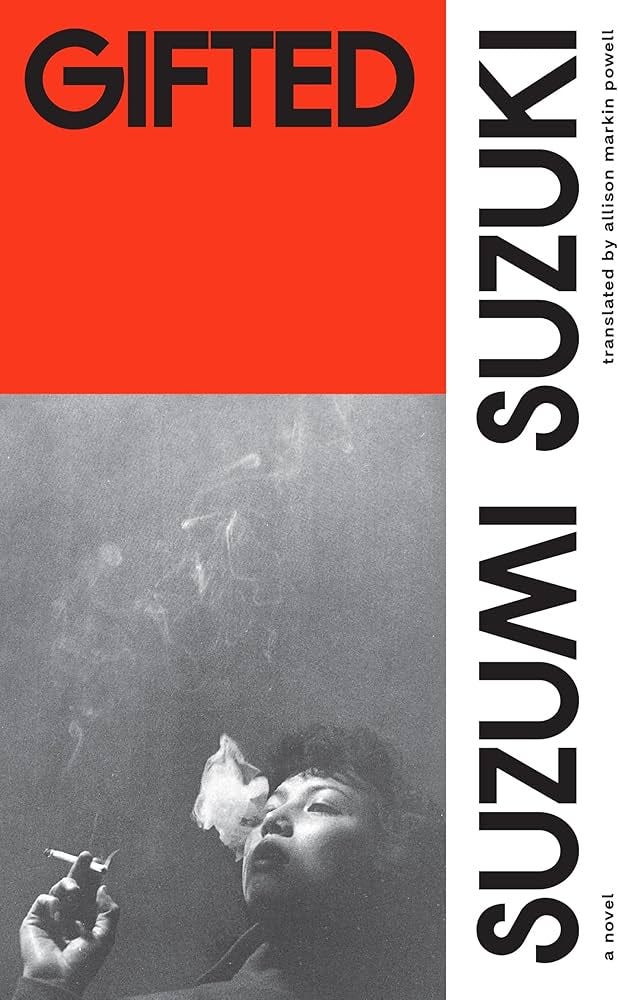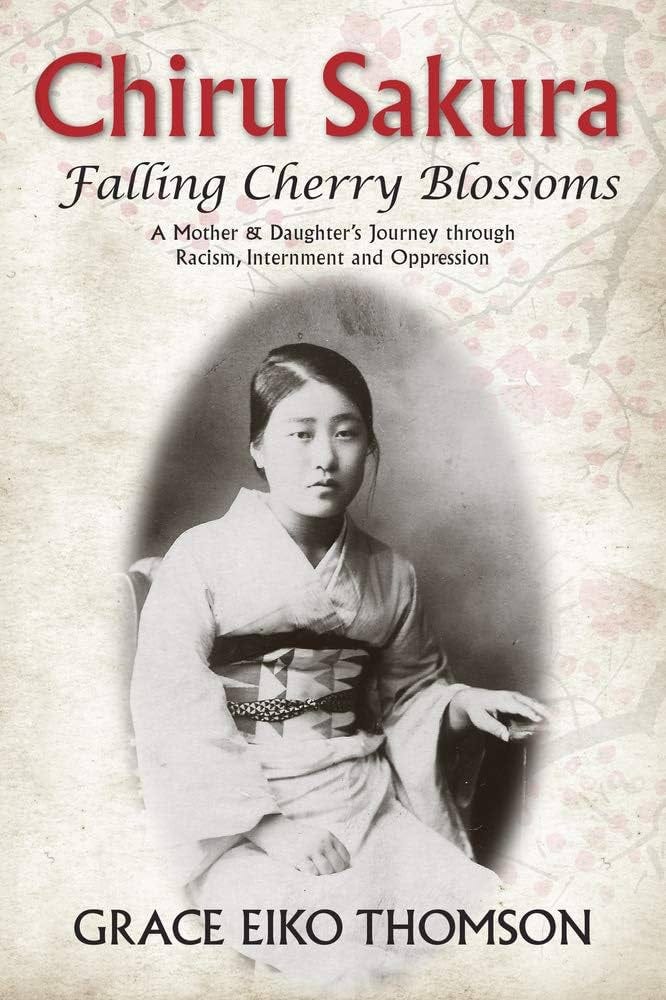Izumi Suzuki, Set My Heart on Fire (Verso, 2024) Suzumi Suzuki, Gifted (Transit, 2024) Mayumi Inaba, Mornings Without Mii (Farrar, Straus and Giroux, 2024) Grace Eiko Thomson, Chiru Sakura: Falling Cherry Blossoms (Caitlin, 2021)
Izumi Suzuki is having something of a comeback thanks to Verso’s translations of her work. After two short story collections (Terminal Boredom and Hit Parade of Tears), they have brought out her first novel in English, Set my Heart on Fire (translated by Helen O’Horan). Suzuki, born in 1949, was a legendary post-war counter-culture figure, moving through the worlds of cinema, music, and modelling, in addition to writing “punky”, experimental fiction, mostly in the science fiction genre.
Set my Heart on Fire isn’t science fiction, but it is quintessentially Izumi Suzuki. Set in the underground music scene of Tokyo in the 1970s, the protagonist, also named Izumi, drinks her way around the clubs, sleeps with rising music stars, and compares notes with her peers. This isn’t a rose-tinted view of those who used to be called “groupies” a la Almost Famous, though: no one really seems to be enjoying themselves and there’s certainly no romance. The book is shot through with a dark melancholy; everyone on the scene is running from something, drowning their demons in sex, drugs and rock n roll. It’s a heartbreaking read, and brings to mind the work of Hitomi Kanehara, whose narrators also baffle the reader with their self-destructive, illogical decisions, drifting from nightmare to nightmare in a fog of apathy.
Similarly, Suzumi Suzuki’s first novel in English, Gifted (translated by Allison Markin Powell) delves into the murky underbelly of Tokyo’s nightlife. This Suzuki worked as a hostess and starred in adult movies before turning to literature to explore those experiences and shed light on the darker corners of Japan’s thriving sex industry.
The narrator—no exact name is given—divides her time between caring for her dying mother and spending all her hard-earned money drinking heavily in host bars. Both mother and daughter have had tough lives, and the novel does not pull its punches in portraying the cycle of abuse and trauma that scars—literally in the narrator’s case after her mother deliberately burns her with a cigarette—everyone in this world. The recent death of Eri, a friend and fellow sex-worker, is never far from her mind, offering the tantalising possibility of escape. In the end it is freedom from her duties as a daughter that offers the faintest glimmer of optimism.
A very different side of Japan can be seen in Mayumi Inaba’s memoir Mornings Without Mii (translated by Ginny Tapley Takemori and published in the UK as Mornings with my Cat Mii). Inaba was a successful poet and award-winning author who, coincidentally, wrote a novel about Izumi Suzuki’s marriage to musician Kaoru Abe, Endless Waltz. In 1977 she found a kitten stuck on a fence and brought her home. For the next twenty years Inaba and Mii became inseparable.
The memoir, written after Mii’s death (hence the “without” in the title) is, on the surface, a cozy, homely story of a woman and her cat, the kind of thing that sells very well at the moment. Beneath the cute veneer, however, like the two books mentioned already, this is an exploration of female loneliness and companionship in contemporary Japan. Inaba’s marriage falls apart, she is forced to move, leaving her beloved home where Mii has a garden and nearby woodland in which to play, swapping it for an apartment on the fifth floor. Their frontiers shrink and they become each other’s whole world. As a result, when Mii finally dies of old age, Inaba is devastated.
Inaba’s world couldn’t be further removed from those of Gifted and Set my Heart on Fire, one of safety and security rather than chaos and danger, but at heart the three books share a common concern. Whether Izumi Suzuki’s Sixties and Seventies, Inaba’s Eighties and Nineties, or Suzumi Suzuki’s 21st century, the question of the place of women in this patriarchal society is scrutinised from multiple angles. Do these women really need men to make them whole and happy? Can they be protagonists in their own right? Are their dreams somehow less important than those of the men in their lives? Inaba makes a life with her and Mii at its centre, but the narrators of the two Suzukis’ books are never so lucky. As a study into how class affects the pathways of women in Japan, these three books read side by side raise fascinating questions.
Finally, from invisible chains to actual imprisonment, Grace Eiko Thomson’s memoir, Chiru Sakura: Falling Cherry Blossoms combines “a mother and daughter’s journey through racism, internment and oppression,” to quote the subtitle. Thomson’s parents moved from Japan to Canada in 1929—her father had emigrated earlier seeking work, and returned to Japan briefly to pick up his bride, an arranged marriage—and Thomson was born under the name Eiko Nishikihama (Thomson became her married name, Grace an adopted “Western” name).
When war broke out in 1941 the family were interned, their money and possessions seized. Blending her own memories with translations from her mother’s unpublished memoir, Thomson paints an agonising picture of racism, mistreatment, and dispossession as an “enemy alien” in the only home she had ever known. Her clear, direct prose style makes the hurt all the more palpable. That hurt would motivate her into becoming a campaigner for social justice and equality, founding the Japanese Canadian National Museum and becoming president of the National Association of Japanese Canadians. Grace Eiko Thomson passed away in July 2024 at the age of 90.
She wrote in this book that, “Women who speak out on issues are more often called troublemakers… while men who do the same are treated and recognized as community leaders. I have come to respect and accept the word troublemaker, used against women, as a compliment.” The women in all four of these books are troublemakers, in Thomson’s positive sense of the word, nails that refuse to be hammered down.







